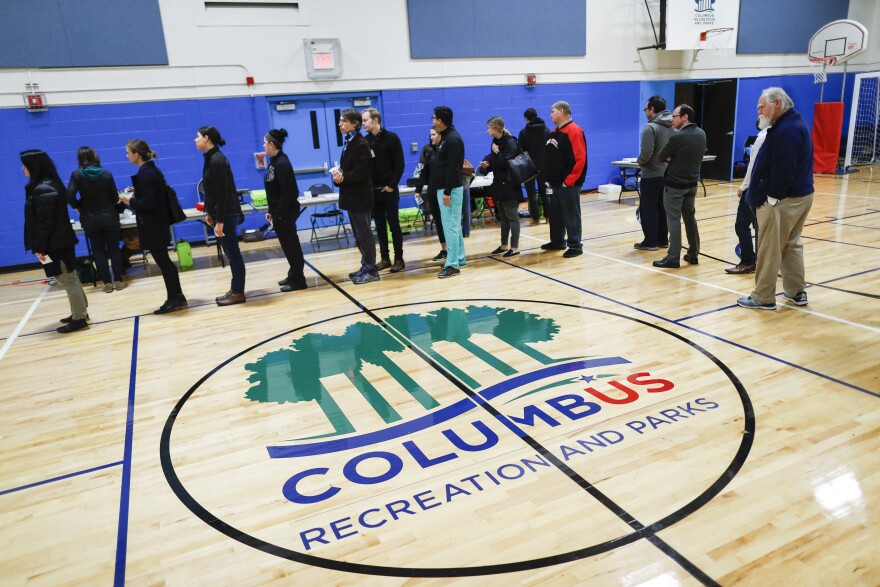Technically, Columbus city elections are non-partisan, but both major parties usually put up slates of candidates for mayor and city council. Not so this year: No Republicans are running for a municipal office.
That means Democrats like Mayor Andrew Ginther are virtually assured re-election.
Lydia Lancaster graduates next month from her residency as an orthodontist. A little further down the road, she’d like to run for office.
“But I’m not quite ready to run yet,” she says. "I’m finishing school, I need to get my orthodontic career started and settled, and a few of those things need to play out, and that takes time.”
Lancaster counts herself a Republican—probably a bit closer to the center than the fringes. She doesn’t know what office she’ll eventually target, but says a part-time post where she could maintain her professional practice would be a good start.
Ohio Republicans did well in last year’s elections, notching victories in each statewide race except Sen. Sherrod Brown’s U.S. Senate seat and two Ohio Supreme Court seats. They also maintained a tight grip on the state’s congressional delegation as well both chambers of the General Assembly.
But while the picture seems great from 30,000 feet, it looks a bit different in Franklin County. Democrats flipped three of four GOP-controlled state House seats, a state Senate seat and the county auditor post.
Doug Priesse, who heads up the Franklin County Republican Party, admits the party’s fortunes have shifted in recent years.
“The Franklin County of 30-40 years ago, which was a Republican base county, is now a Democratic base county,” Priesse says. “But that doesn’t mean we don’t compete, and fight where we can be victorious. We do do that, and we’re proud of the record.”
That’s reflected in the upcoming Columbus municipal elections. Republicans haven’t been able to field anyone to run for city council or mayor.
Priesse argues the city’s system is rigged. Instead, his party will focus on the suburbs.
“That’s where we can make a difference,” he explains. “We’re not going to frankly waste resources and time and effort where the outcome is pre-ordained.”
Priesse argues the city’s at-large election system—in which City Council seats are selected by the entire city, rather than by wards—and token campaign contribution limits stack the deck against the GOP.

But it’s demographics, not just the current political system, that’s to blame.. Columbus simply has more Democrats than Republicans. GOP strategist Bob Clegg says his party faces the same problem nationwide as Republican voters abandon cites for the suburbs.
“That started in the '80s and then accelerated in the succeeding two decades, which results in a much smaller pool of Republican voters in the city of Columbus,” Clegg says.
Clegg says it could take a scandal or some kind of break down in governance for the GOP to resonate with Columbus voters again. When it comes to his advice for young people like Lancaster considering a run, Clegg is pretty blunt.
“Move,” he says, with a harsh laugh. “There’s just no way. It’s just so tough to win in the city.”
Other Republicans are a little more optimistic, even one recently bounced from office. Franklin County Auditor Clarence Mingo lost his re-election bid to Democrat Michael Stinziano in November. He says the key for future candidates is engaging new or undecided voters rather than preaching to the choir.
“The modern, new Republican in Franklin County, the potential candidate base for Franklin County, has to have a commitment to engaging every single constituency in this county,” he says.
Columbus has a rich history of successful Republican mayors, including a young Jim Rhodes, Buck Rinehart and Greg Lashutka, the last Republican mayor of Columbus, who left office in 2000. Lashutka still sees a path for Republican candidates.
“It’s harder today than it was in my time period, but it’s not impossible,” Lashutka insists. “So I think we just have to keep working on a bench, help young people, mentor them, help [them] understand that opportunity doesn’t come all the time, but when it does—be prepared.”
For her part, Lancaster isn’t all that troubled with the political landscape in Franklin County. That might change once she’s actually running, but she argues politics is cyclical and there could be a better path once she’s ready.
“I definitely acknowledge that it is a hard time right now to be running as a Republican in the Franklin County area,” Lancaster says. “But I by no means—I think that’s very temporary.”
But if city politics moves in regular cycles, the shift could be a long time coming. Democrats have controlled city hall since 2000. Before that, a succession of Republicans led the city for nearly three decades.
This year, incumbents’ only challenge is coming from candidates on their left flank.






